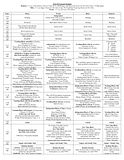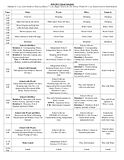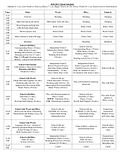Thank you so much for sharing more about your day! That really does help us partner with you in thinking through this.

You already made a good discovery by paying attention to which things are taking too much time in the day. Often times, as moms, we feel like everything is going long, when really it's probably just a few things. This is good news! Changing those few things can have a BIG impact then - hooray!

So, just as a recap, here are the times for BHFHG...
Cursive = 5-7 minutes
Drawn into the Heart of Reading 20-30 min. total (including reading time - we only read one chapter a session)
Math = 20 minutes
Reading About History Box (8-10 min.), Bible Study Box (5- 10 min.), and Bottom left corner box of "Learning Through History" (15 min.) done in one sitting totaling 35 min. (Note: Art days take a little longer.)
Dictation (5 min.), Poetry (5-10 min.), Rod and Staff English (10-15 min.), and Storytime (15 min.- We read aloud only one chapter a day. Some moms do more!) done in one sitting totaling 35 min.
Hymns at lunch (5-10 min.)
Science (after lunch - 15-35 min.- depending on whether there's an experiment or a notebooking entry or just oral narration)
So, R & S English should take around 10-15 minutes. By using HOD's ideas to do most of the lesson orally, reserving one small section to be written, and using a markerboard as needed, you'll see time melt away!
 He spells exactly like it sounds. I know that he knows that certain letter combinations make certain sounds and he did great with phonics, but when he is
He spells exactly like it sounds. I know that he knows that certain letter combinations make certain sounds and he did great with phonics, but when he is
asked to spell it's like he doesn't have a clue! We are repeating the 2nd spelling list from last year in Beyond because I felt like he didn't have them down well enough. This year if he spells the words easily with no trouble the first time, we go on to the next list if not we are staying with that list until he gets it. Then, he will do well when we quiz him and he will have to write that same word in a sentence and he has no clue how to spell it even though he spelled it during spelling. I've tried explaining that it is the same word and he usually has a melt down. We do all of the excercises listed in HOD for spelling and I will put the words in an online spelling game and do that also, hoping it might help it stick if it's fun for him.
For language arts, I really think it's because he doesn't like writing and that he has trouble spelling words. I think he has it all down and we will get to the review and he doesn't know what any of the answers are. We just finished unit 5 and he had the pictures of Noah's Ark to write sentences about. He kept saying " I don't get it." He knows the Bible well and knows that story, I wound up having to sit with him and go through each picture and saying "What is that?" "What kind of sentence could you write for that?"
He does seem to do better if I stay beside him the entire time he is working and hold his hand and walk him through it which doesn't work well when you are working with another child of course.
As far as the spelling, mastery is not needed to move on to the next level. Dc will misspell words that they spelled correctly earlier from time to time. This is alright! Spelling words correctly is something dc take on gradually more and more, and accuracy continues to improve as they move through the levels of dictation. Here is a recap of how spelling goes in HOD...
Day 1: teacher shows student word written in black on index card, when student says he's ready, card is taken away, and student writes word in black on markerboard; if student misses word, teacher erases word, shows card again, when student says he's ready, card is taken away, and student writes word in black on markerboard
Day 2: teacher says word and uses word in sentence, student tries to write it on markerboard, if student misses word, teacher shows card, takes card away, and has student rewrite it correctly on markerboard; teacher moves on to next word until through all words and then does the whole sequence one more time with each word
Day 4: repeat Day's 2's exercise, only for each missed word do fun large gross motor activity to practice words missed (i.e. jumping in place to spell word out loud)
You'll notice that there is not a quiz involved, nor are there more than 10 words dc are expected to be responsible for. So, by simply following these plans using Spelling List 2's words only, you will find spelling again becomes fun, shorter, and ds will be more able to focus on just his 10 words each week without the pressure of a quiz. Next year, he needs to move on to Dictation Level 2. I know this is not the traditional way of doing spelling, but that is intentional.

Here are some past posts that may be helpful in explaining this...
CM Style Spelling in HOD (why do it, describes spelling plans too):
viewtopic.php?f=6&t=5645&p=41357#p41357
Spelling retention – why not to pretest by Carrie:
viewtopic.php?f=6&t=7415&p=54282#p54282
Why HOD does spelling lists before dictation, by Carrie:
viewtopic.php?f=6&t=10388
So, by doing spelling the HOD way, you will find time falls off the day this way too! Hooray!

Take heart - my oldest ds was NOT a good speller when he did his HOD spelling lists. Several years of speech therapy early on in life let me know spelling would probably be a challenge for him. Now he is in high school, having just completed Level 8 of HOD's dictation passages, and he rarely misspells anything! This will be your ds's story too if you just keep up with HOD's spelling/dictation progression.



As far as math goes, I am not clear what he did for math last year, and what he is doing for math this year. Could you please share when you get the chance? That would be so helpful as proper placement can probably then be determined, which also impacts the expected level of mastery of facts and story problems, as well as the amount of hands-on work intended.

Thanks!!!
The role we play as teachers is sometimes hazy. We're used to what we had in ps, which was one teacher to 20+ students. Homeschooling is different - which is wonderful!

Dc have access to immediate feedback and help from their teacher, and as such, their school day should be significantly shorter.

The role of the homeschool teacher changes through the years, from guide to guide within HOD. I consider BHFHG as one of my most important teaching years. There is not much intended independence in that guide.

In other words, I've found I need to be right near my dc's side, helping them as needed, and keeping them moving along so that they are finishing successfully for most of the guide. It is not until PHFHG that guides are labeled with "I" independent boxes and "S" semi-independent boxes. That is because at the BHFHG level of skills, work is not intended to be largely independent. If boxes were labeled in BHFHG, "T" would be the predominant letter in the corners of each box. So, you can feel just fine staying by your child's side and helping him finish his R & S English in 10-15 minutes, as opposed to teaching a portion, walking away, and leaving him to finish on his own.

Sometimes, by the last third of the guide, dc take on a little more independence successfully, but that is only due to the previous 2/3 of the guide's training, and even then, there is not a whole lot of independence in BHFHG.

Skills will come around again, and when they do, they'll be intended to be more semi-independent, and then after one more go-around, they'll be intended to be more independent. This usually happens over the course of years, from guide guide, rather than within 1 year in 1 guide. So, this takes the pressure off of total mastery this year, and lets you know going back to reteach things like spelling, math, etc. is not necessary, because total mastery is not expected. It is planned for you to be partnering with your child this year.



PHFHG is another story!

You can see the boxes are labeled, and 1/3 of them are "I" independent boxes, about 1/3 of them are "S" semi-independent, and about 1/3 of them are "T" teacher-directed. So, in this guide your role as a teacher changes, as does the student's role. Of course, even those "I" boxes and "S" boxes have to be introduced and taught at first. But then, usually after a month or so, we have found they truly are able to be completed quite solo by the student.

So, having dc in both BHFHG and PHFHG, it may be wise to go half-speed in BHFHG. I am wondering if ds in BHFHG is doing "Drawn into the Heart of Reading" for his reading instruction? This will surely put the love of reading back into his heart, as well as give you a subject your two sons can partner in doing.

Going half-speed in BHFHG along with full-speed DITHOR 2/3 may be just the right balance for ds. For PHFHG ds, it sounds like things are going well, so continuing full-speed would be fine. Then, the following year, ds can finish out BHFHG, and older ds can be on to CTC. This will put a guide between them, which is nice for mom too.

One last thing touched upon that is a fantastic idea is teaching math at the same time to the 2 of them. Just because we are teaching multiple guides, we need not teach all one guide, then teach all the next guide, and so on. If I did that with the 3 guides I'm teaching, I'd be teaching FOREVER!

And I work part-time too, so that is not an option.

Having teaching blocks and independent blocks of time has helped me schedule my day. Here some past schedules of mine that have some of the guides you are using, just so you can see what I'm trying to describe here...
PHFHG...

Half-speed BHFHG...

Full-speed BHFHG...

I hope something can help here - but HUGS to you and know - you have the power to change all this and are entitled to joyful homeschooling days!



Don't let previous ps experiences drive what homeschooling needs to look like in your home. It's not working all that well in the ps realm - there is no need to try to recreate that setting at home. I am excited for you to make a few changes and see how your day can be different! I think you will find your groove and be enjoying your homeschooling then in no time. God bless!
In Christ,
Julie


